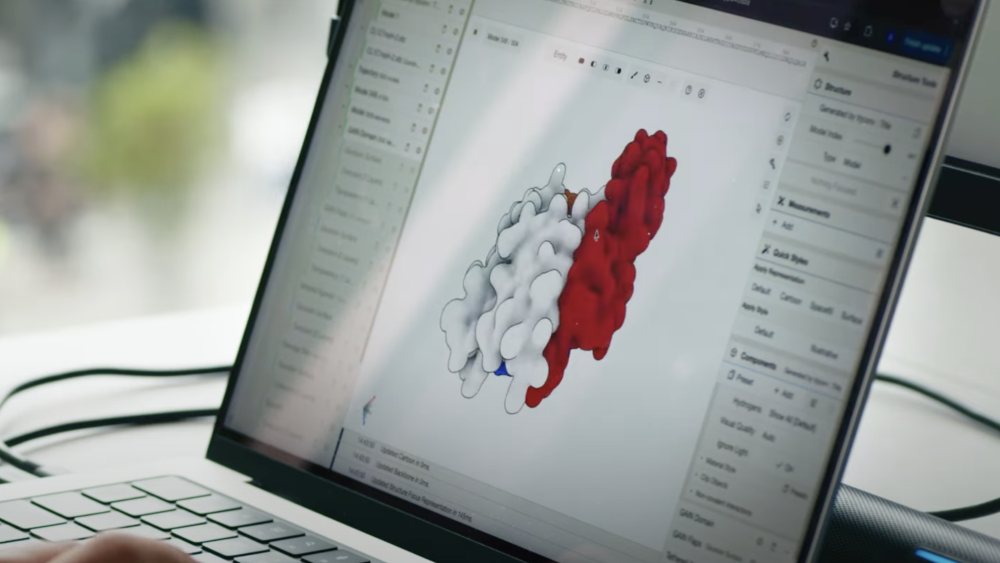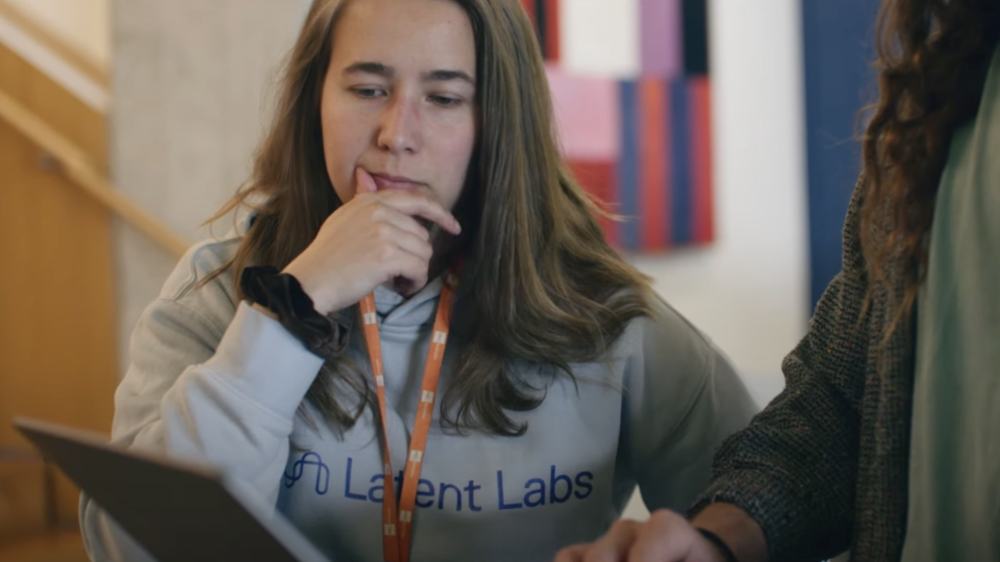How was this content?
- Learn
- Mastering the machine: Latent Labs engineers the future of biology
Mastering the machine: Latent Labs engineers the future of biology
In Julien Offray de La Mettrie’s 18th century work, l’homme machine, the philosopher likened the human body to a complex machine. Decades later, pioneering biologists and biophysicists like Thomas Huxley and Francis Crick drew comparable analogies. Today, that mechanistic view of biology shapes the operations, mission, and future ambitions of Latent Labs. “Biology underpins humanity; all of our bodies are made up of its building blocks,” says Simon Kohl, founder and CEO. This field of science, he explains, is “a system that computes,” and our cells, like “mini-computers.”
Early figures channeled their philosophies into their work, laying the groundwork for the development of rigorous, testable sciences. In parallel we’ve seen an evolution of machines themselves, from industrial mechanisms to, more recently, powerful artificial intelligence. Latent Labs is building on this, taking the age-old analogy of biology as machinery into a new era. By harnessing generative AI, the startup is helping scientists make biology “programmable,” says Kohl, and ultimately “computationally master biology, in order to advance therapeutics research.”
Latent Labs engaged with AWS through the AWS Generative AI Accelerator Program, accessing support, connections to the AWS network, go-to-market strategies, and solutions including Amazon SageMaker HyperPod. This has enabled the company to train and build proprietary models and efficiently and reliably scale compute and inference resources. Its Latent-X model, available on the Latent Labs Platform is “breaking conventions of the past,” offering a generative-AI powered approach to protein design that “sidesteps and augments lab experiments.”

Finding order in chaos
Biology may be “a system that computes,” says Kohl, but advancements are still hampered by technological limitations in the lab. Research traditionally involves “searching in nature, doing wet lab experiments, and getting back random results, only some of which may be good.” Biological data can look “chaotic,” he continues, while lab experiments “are often cumbersome, lengthy, and costly; you need to get reagents and there's certain applications where lab experiments are not easy to do.”
Rather than being at the mercy of nature, Latent Labs’ mission was to “make this programmable rather than just discovering observationally what nature gave us.” The company is building foundation models and creating algorithms to model the interactions between proteins, DNA, RNA, and small molecules—the building blocks of biology. By embedding these into its platform, Kohl is helping biologists, biochemists, and protein engineers at pharma and biotech companies to, “in a push button way, get to a molecule that otherwise they would've had to wait weeks, maybe months for in different optimization steps.”
The impact, he continues, will be tremendous and “completely change the industry and also change as a species what we can expect in terms of how we treat our ailments and illnesses.” The speed and scale of doing so could be vastly improved, tailored to the individual, and unlock opportunities to solve “an entirely different class of problems” in fields ranging from food tech and agriculture to climate science.
However, like the scientists it’s supporting, Latent Labs also faced challenges. Data is key when it comes to training and building proprietary models, and the company was tasked with curating and fusing datasets from a multitude of sources. In addition, “we need to run many experiments in parallel. But then there are also phases where we want to double down on a particular idea and architecture and just scale that up.” All of this, says Kohl, “requires access to reliable compute, that is also scalable in many ways.”
Accelerating innovation with scalability, reliability, and community
Latent Labs turned to AWS for support, in a collaboration that encompasses and exceeds the technical, offering wide-ranging benefits. The relationship “came with significant contributions on the computational side, but perhaps more importantly, we feel it actually gave us access to a really great community,” explains Kohl. In terms of the computational, “the most critical AWS technology for us right now really is Hyperpod. It allows us to seamlessly scale our compute, whether that's for training or inference. Because we have such a variety and diversity of different use cases internally, that's really enabling, having that flexibility.”
Amazon SageMaker HyperPod allows users to quickly scale model development tasks such as training, fine-tuning, or inference (using a model to make predictions based on new data), across a cluster of hundreds or thousands of AI accelerators. Using the solution, Latent Labs can run inference at scale, and quickly and easily scale up and down as required; “having that at our fingertips allows us to determine the state of our model performance” in real-world conditions, explains Kohl, and “has made a big difference in how efficiently we were able to do research.”
The ability to more precisely and easily generate and test new biological sequences (like DNA) via AI models will ultimately speed up their manufacture and deployment in the real world. “Rather than having to accept whatever nature gave us or what we may randomly find in a lab experiment, we can really precisely control and tailor with AI systems,” says Kohl. “If you think about this end to end, that'll be truly enabling, whether it's on the molecular level, making new drugs or later at a systems level.” He continues, “That’s really at the core of the idea, moving biology from an observational science to an engineering science.”

From science to support: in addition to “really well-built and engineered infrastructure,” says Kohl, Latent Labs’ relationship with AWS also included participating in the AWS Generative AI Accelerator Program. This gave the startup the opportunity to meet AWS teams as well as other participants in the cohort, “which was a great opportunity to learn from each other,” says Kohl. Accessing and engaging with this diverse network of companies helped Latent Labs address a crucial underlying question in its startup journey: “how do you go from this seed substrate stage to a much larger company, a successful company within the AWS ecosystem?”
The answer came about through a “much deeper partnership” which developed between Latent Labs and AWS, involving support with go-to-market strategies, talking to AWS partners, and making connections across AWS networks. It has also opened up future opportunities for growth. “We're speaking about integrating with some of the AWS platforms that are customer-facing, whether that’s Amazon Bedrock or other platforms in the making,” says Kohl.
A shared philosophy for an exciting future
Latent Labs’ initial focus was on building solutions that model molecular interactions. As its partnership with AWS progresses and its approach develops, the company hopes to be able model entire organisms in the future. “That would be the dream,” says Kohl.
AI is a powerful accelerator and “technology in and of itself is exciting,” he continues, but “what excites me the most is essentially putting that kind of mastery of biology into the hands of researchers.” With support from AWS— through visibility at events like AWS Re:invent and help developing go-to-market strategies— Latent Labs is realizing that vision. These efforts are amplified by a deeper foundation: a shared philosophy between the two companies. “There’s a really great alignment in that we are both focused on companies and partners that use our technologies,” says Kohl.
Like AWS, Latent Labs believes that trust and customer-centricity underpin innovation and meaningful partnerships. While AWS has helped accelerate the startup’s ability to build and scale, Latent Labs remains focused on empowering the people who matter most: the scientists. It is “the practitioners, the biologists, and bioengineers, who are the ones who know best what to apply these models to,” says Kohl. By putting powerful, intuitive tools into their hands, Latent Labs is reinventing an old idea with new technology: that biology, like a machine, can be decoded, understood, and engineered. “This alignment is what I think makes us so excited about this strategic partnership,” Kohl concludes.
How was this content?